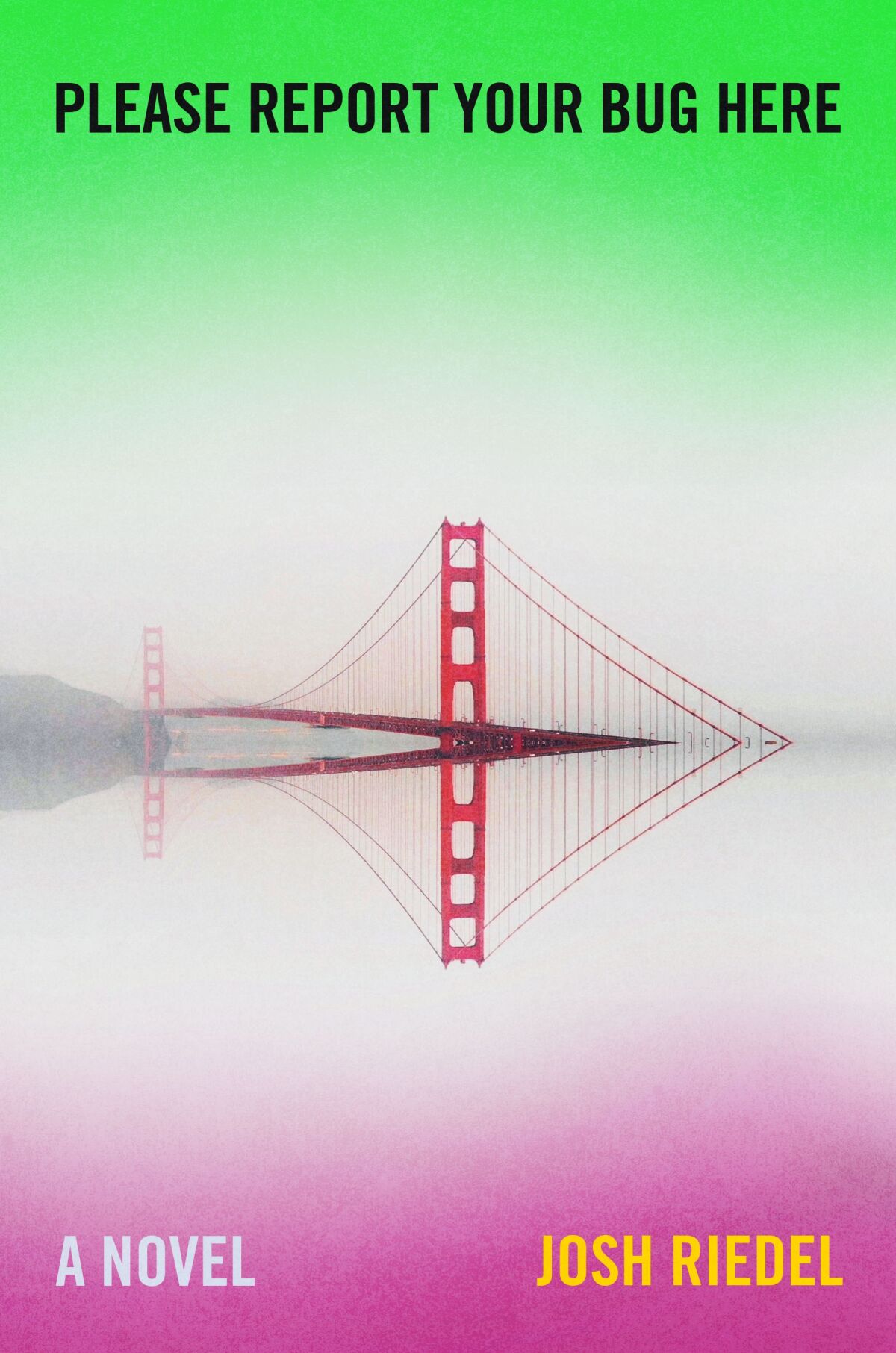Review
Please Report Your Bug Here
By Josh Riedel
Holt: 288 pages, $28
If you buy books linked on our site, The Times may earn a commission from Bookshop.org, whose fees support independent bookstores.
Josh Riedel’s “Please Report Your Bug Here” takes place in Silicon Valley in the early 2010s. As the author was a very early Instagram employee and his debut novel, which comes festooned with blurbs from literary tech skeptics, is framed as a diaristic exposé, we are primed for some high-stakes, close-to-the-bone satire. And yet, this is not quite the world we know.
The tech, for one thing, is more advanced. Ethan, a recent art history major working for a start-up dating app called DateDate, explains that one of the app’s best features is its “mood-sensing tech” that uses your “phone’s camera, microphone, and accelerometer to understand your current mood.” Also, there are “everlasting churros that regenerated themselves after each bite” and paintings that respond to the viewer’s feelings — so when a confused Ethan looks at one, it changes from “landscape mode into psychedelic swirls.”
In a world that differs from ours, one of the most effective ways a novel can clue a reader into its logistics is through the reactions of the characters. When Ethan, our narrator, comes across these technological marvels, he doesn’t bat an eye. Lending verisimilitude to this alternate universe, the tech described isn’t particularly Jetsons-like — flying cars and robot maids these are not. But when Ethan makes an accidental discovery while trying to clean up bugs in DateDate’s code, the established rules are broken, revealing (and perhaps even creating) a glitch in the novel’s tone that never quite resolves itself.
Here’s what I mean: The discovery Ethan makes is that when he views the user the dating app deems his optimal match, Ethan briefly transports to a strange realm that comes to be referred to ambiguously as “other worlds.” He stands “in a field, with tall, wet grass” under a sky “filled with birds,” and hears the whoosh of nearby ocean waves before suddenly appearing back in his office. His boss asks if he’s OK, and Ethan enacts a common sci-fi trope, pretending he’s fine because he can’t account for what just happened and because, conveniently enough, when he does try to explain it, he loses “all memory of what had happened, of where I had gone.” Then he just goes back to work.
But this isn’t what threw me off; rather it was the weird stuff that felt oddly normal. DateDate, like a lot of start-ups, gets acquired by the Corporation, an Apple-like company with an elaborate campus and endless resources that turns out to be responsible for Ethan’s teleportation accident. As a way to test a new product called Portals, “a stand-alone app that transports you to various vacation destinations,” the Corporation “pushed experimental code into DateDate” before they bought it. Ethan’s “other world” is a bug the Corporation hasn’t quite figured out.

The release of Portals is much anticipated — beta testers include Johnny Depp and Beyoncé — and no one seems fazed by the invention of teleportation, never mind that it’s far more Jetsonian than any other of the book’s extrapolations of current technology. It takes a while for Homeland Security to interfere with Portals, but even then it’s only because a small portion of the trips may have been “undocumented.” Why isn’t any of this treated like the monumental, world-shifting development that it is?
This blasé reaction is made all the more confounding in light of the rest of the novel, which is firmly rooted in the real world. References to lyrics by the National, the paintings of Matisse and Miro, two books by Adrienne Rich and Sofia Coppola’s “Lost in Translation” (Ethan stays at the Tokyo hotel featured there) — all of this grounds Ethan’s narrative in a recognizable reality. It’s hard to square this familiarity, bordering on banality, with the technological magical realism.
If this sounds like nitpicking, that’s because it is. But in stories like this, the careful cultivation of an invented world requires delicacy and nuance, and on such a precarious path a minor stumble can build to a major crash. Creating a believable setting — particularly a semi-realistic one crucial to the story — is as important to the success of a novel (and as difficult) as creating compelling characters and interesting narratives.
In fact, the teleportation stuff typifies the problems of “Please Report Your Bug Here.” The plot mechanics, which involve a Lisbeth Salander-type named Noma looking for a little girl who has been trapped in the “other worlds,” stretch credulity in similar ways. How has the girl survived for years in this ephemeral non-place that is alternately, fuzzily characterized as a void, a personal inventory of memories or another dimension? Like, what did she eat? And why aren’t any of the characters — including the girl’s father — asking these questions, if only to let the reader know that such things have been considered?
A generous reader might be tempted to write this off as a byproduct of satire, which stretches the rules of plausibility in a way hard sci-fi might not. But then, the satirical elements are not sharp enough to justify it. The Corporation is just like all the giant conglomerates villainizing contemporary narratives, from Dave Eggers’ “The Circle” to “Silicon Valley’s” Hooli to “WALL-E’s” Buy n Large to “Severance’s” Lumon Industries. The founder of DateDate is literally named the Founder (capital F), and that’s how everyone refers to him, but then there is a character only referred to as the engineer (lowercase e) — a jab, no doubt, at the hierarchies of tech, where only the top tier are treated as proper nouns. But it also reduces these characters to tropes.
Riedel aims to use these high-concept ideas to explore existential questions about identity and art and technology, and there are moments when his riffs on these topics are effective, even insightful. But novels are not unlike a complex piece of programming: A bewildering number of hidden components must work in concert to make seemingly simple functions possible, and as Riedel’s debut shows, tiny bugs in the code can collapse the entire enterprise.
Clark is the author of “An Oasis of Horror in a Desert of Boredom” and “Skateboard.”


